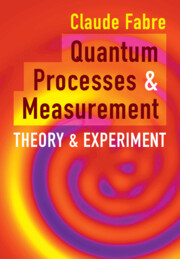Book contents
- Frontmatter
- Contents
- Introduction
- 1 Experiment: Detecting Single Quantum Objects
- 2 Description of Quantum Systems in Terms of the Density Matrix
- 3 Experiment: Quantum Processes
- 4 Evolution
- 5 Measurement
- 6 Experiment: Bipartite Systems
- 7 Entanglement
- 8 Experiment: Continuous Quantum Fluctuations
- 9 Continuous Variable Systems
- 10 Experiment: Parameter Estimation
- 11 Theory: Parameter Estimation
- A Basic Postulates of QuantumMechanics: a Reminder
- B Generalized Postulates of Quantum Mechanics
- C Description of Composite Systems
- D Qubits
- E Quantum Particle
- F Quantum Electromagnetic Field
- G Interaction between Light and Atoms
- H Interaction between Light Beams and Linear OpticalMedia
- I Interaction between Light Beams and Nonlinear OpticalMedia
- J Optomechanics
- K Basics of Circuit Quantum Electrodynamics
- References
- Index
8 - Experiment: Continuous Quantum Fluctuations
Published online by Cambridge University Press: 27 July 2023
- Frontmatter
- Contents
- Introduction
- 1 Experiment: Detecting Single Quantum Objects
- 2 Description of Quantum Systems in Terms of the Density Matrix
- 3 Experiment: Quantum Processes
- 4 Evolution
- 5 Measurement
- 6 Experiment: Bipartite Systems
- 7 Entanglement
- 8 Experiment: Continuous Quantum Fluctuations
- 9 Continuous Variable Systems
- 10 Experiment: Parameter Estimation
- 11 Theory: Parameter Estimation
- A Basic Postulates of QuantumMechanics: a Reminder
- B Generalized Postulates of Quantum Mechanics
- C Description of Composite Systems
- D Qubits
- E Quantum Particle
- F Quantum Electromagnetic Field
- G Interaction between Light and Atoms
- H Interaction between Light Beams and Linear OpticalMedia
- I Interaction between Light Beams and Nonlinear OpticalMedia
- J Optomechanics
- K Basics of Circuit Quantum Electrodynamics
- References
- Index
Summary
Experimental chapter devoted to quantum observables endowed with continuously varying quantum fluctuations, such as position and momentum, quadrature operators, or phase and amplitude of electromagnetic fields . It shows that one can manipulate this quantum noise by generating squeezed states of light, always within the limits imposed by the Heisenberg inequality, and create strong correlations between these observables to conditionally generate quantum states having intensity quantum fluctuations below the "shot noise" limit imposed by the existence of vacuum fluctuations. Describes an experiment dealing with macroscopic mechanical oscillators displaying motional squeezing below the zero point fluctuations, and another one dealing with macroscopic superconducting exhibiting a whole spectrum of strongly nonclassical states, generated by using the strong anharmonicity of the Josephson potential.
Keywords
- Type
- Chapter
- Information
- Quantum Processes and MeasurementTheory and Experiment, pp. 135 - 141Publisher: Cambridge University PressPrint publication year: 2023

